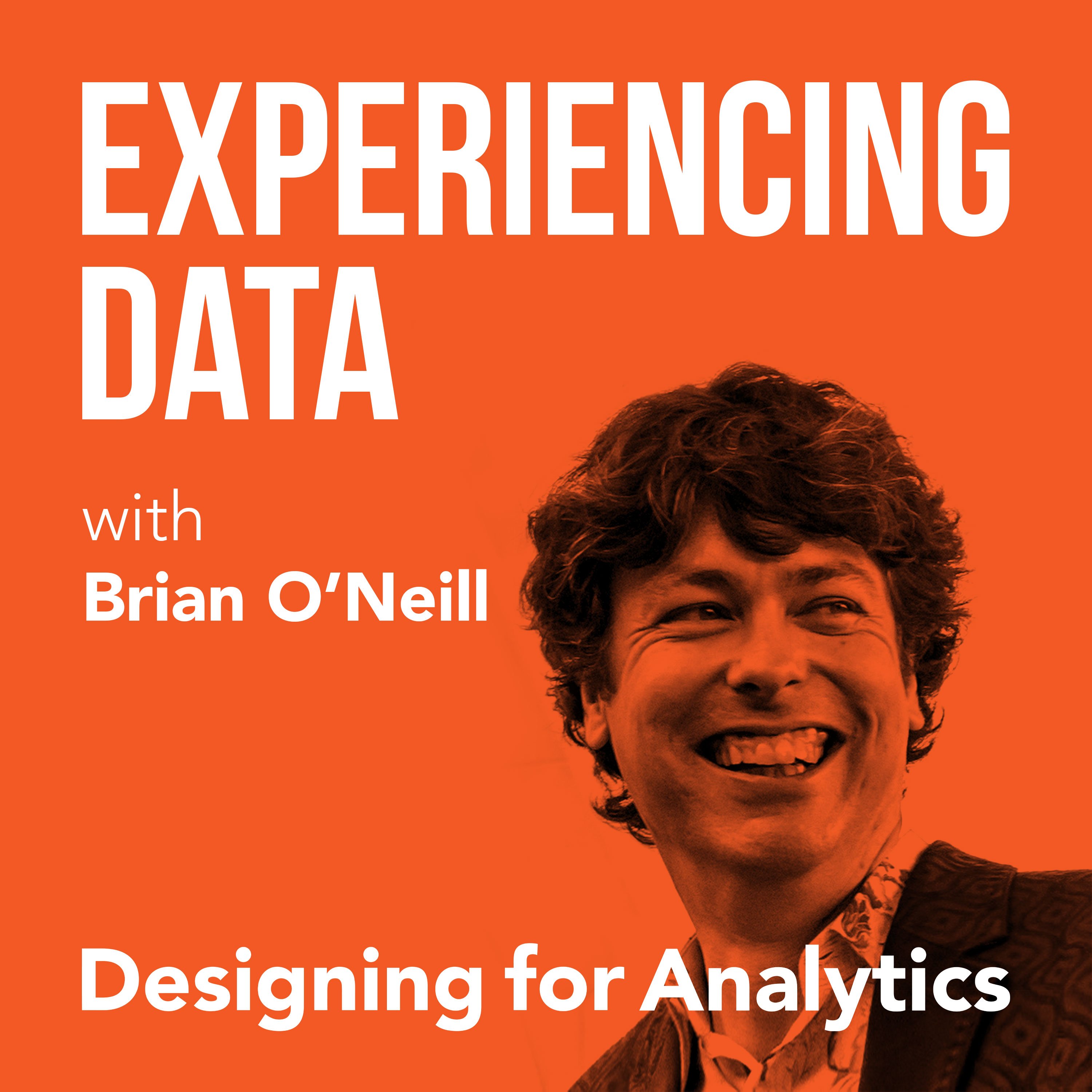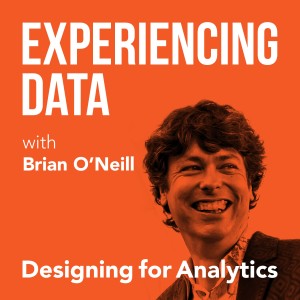

154.9K
Downloads
185
Episodes
Is the value of your enterprise analytics SAAS or AI product not obvious through it’s UI/UX? Got the data and ML models right...but user adoption of your dashboards and UI isn’t what you hoped it would be?
While it is easier than ever to create AI and analytics solutions from a technology perspective, do you find as a founder or product leader that getting users to use and buyers to buy seems harder than it should be?
If you lead an internal enterprise data team, have you heard that a ”data product” approach can help—but you’re concerned it’s all hype?
My name is Brian T. O’Neill, and on Experiencing Data—one of the top 2% of podcasts in the world—I share the stories of leaders who are leveraging product and UX design to make SAAS analytics, AI applications, and internal data products indispensable to their customers. After all, you can’t create business value with data if the humans in the loop can’t or won’t use your solutions.
Every 2 weeks, I release interviews with experts and impressive people I’ve met who are doing interesting work at the intersection of enterprise software product management, UX design, AI and analytics—work that you need to hear about and from whom I hope you can borrow strategies.
I also occasionally record solo episodes on applying UI/UX design strategies to data products—so you and your team can unlock financial value by making your users’ and customers’ lives better.
Hashtag: #ExperiencingData.
JOIN MY INSIGHTS LIST FOR 1-PAGE EPISODE SUMMARIES, TRANSCRIPTS, AND FREE UX STRATEGY TIPS
https://designingforanalytics.com/ed
ABOUT THE HOST, BRIAN T. O’NEILL:
https://designingforanalytics.com/bio/
Episodes

Tuesday May 16, 2023
Tuesday May 16, 2023
Today I’m chatting with Phil Harvey, co-author of Data: A Guide to Humans and a technology professional with 23 years of experience working with AI and startups. In his book, Phil describes his philosophy of how empathy leads to more successful outcomes in data product development and the journey he took to arrive at this perspective. But what does empathy mean, and how do you measure its success? Brian and Phil dig into those questions, and Phil explains why he feels cognitive empathy is a learnable skill that one can develop and apply. Phil describes some leading indicators that empathy is needed on a data team, as well as leading indicators that a more empathetic approach to product development is working. While I use the term “design” or “UX” to describe a lot of what Phil is talking about, Phil actually has some strong opinions about UX and shares those on this episode. Phil also reveals why he decided to write Data: A Guide to Humans and some of the experiences that helped shape the book’s philosophy.
Highlights/ Skip to:
- Phil introduces himself and explains how he landed on the name for his book (00:54)
- How Phil met his co-author, Noelia Jimenez Martinez, and the reason they started writing Data: A Guide to Humans (02:31)
- Phil unpacks his understanding of how he defines empathy, why it leads to success on AI projects, and what success means to him (03:54)
- Phil walks through a couple scenarios where empathy for users and stakeholders was lacking and the impacts it had (07:53)
- The work Phil has done internally to get comfortable doing the non-technical work required to make ML/AI/data products successful (13:45)
- Phil describes some indicators that data teams can look for to know their design strategy is working (17:10)
- How Phil sees the methodology in his book relating to the world of UX (user experience) design (21:49)
- Phil walks through what an abstract concept like “empathy” means to him in his work and how it can be learned and applied as a practical skill (29:00)
Quotes from Today’s Episode
- “If you take success in itself, this is about achieving your intended outcomes. And if you do that with empathy, your outcomes will be aligned to the needs of the people the outcomes are for. Your outcomes will be accepted by stakeholders because they’ll understand them.” — Phil Harvey (05:05)
- “Where there’s people not discussing and not considering the needs and feelings of others, you start to get this breakdown, data quality issues, all that.” – Phil Harvey (11:10)
- “I wanted to write code; I didn’t want to deal with people. And you feel when you can do technical things, whether it’s machine-learning or these things, you end up with the ‘I’ve got a hammer and now everything looks like a nail problem.’ But you also have the [attitude] that my programming will solve everything.” – Phil Harvey (14:48)
- “This is what startup-land really taught me—you can’t do everything. It’s very easy to think that you can and then burn yourself out. You need a team of people.” – Phil Harvey (15:09)
- “Let’s listen to the users. Let’s bring that perspective in as opposed to thinking about aligning the two perspectives. Because any product is a change. You don’t ride a horse then jump in a car and expect the car to work like the horse.” – Phil Harvey (22:41)
- “Let’s say you’re a leader in this space. … Listen out carefully for who’s complaining about who’s not listening to them. That’s a first early signal that there’s work to be done from an empathy perspective.” – Phil Harvey (25:00)
- “The perspective of the book that Noelia and I have written is that empathy—and cognitive empathy particularly—is also a learnable skill. There are concrete and real things you can practice and do to improve in those skills.” – Phil Harvey (29:09)
Links
- Data: A Guide to Humans: https://www.amazon.com/Data-A-Guide-to-Humans/dp/1783528648
- Twitter: https://twitter.com/codebeard
- LinkedIn: https://www.linkedin.com/in/philipdavidharvey/
- Mastodon: https://mastodonapp.uk/@codebeard
No comments yet. Be the first to say something!